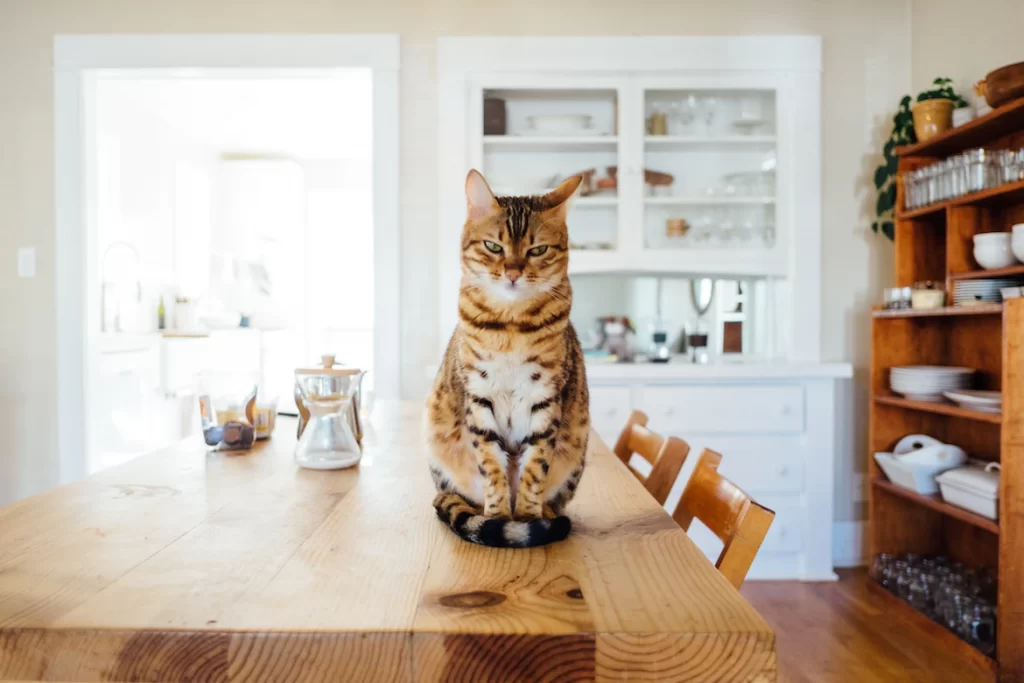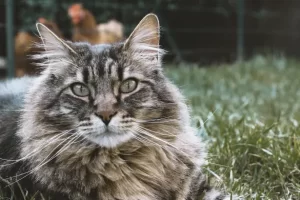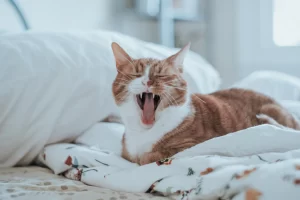Last updated on February 4th, 2023 at 10:02 am

Cats feel comfortable eating most of the food humans eat at home. However, there are some types of food we eat that can cause problems for cats. So, as a cat lover, you should be responsible for researching which foods are suitable for the pet. This will help you identify only the safe food for your cat, leaving out the ones that may cause a severe problem for your cat. Remember, the kitten may eat any food even if it ends up causing problems to its diet. The pet may be unable to reject all the wrong foods.
When it comes to eggs, most cats eat eggs while others don’t. For this reason, we can conclude that cats can eat eggs. However, if you have never fed your little kitten with an egg, you must consult your veterinarian before introducing food to the cat’s diet. If the vet approves the egg to be safe for your cat, you can try feeding it with a shot.
It is essential to start feeding the cat with a small number of eggs. Just ensure you don’t overfeed the kitten with the egg on its very first time. The pet may end up abandoning the eggs and not feel comfortable eating them anymore. Let’s see why feeding your cat with an egg is essential in the pet’s diet.
Importance of Eggs in Cats Diet
Cats are known to consume birds, whether in a raw state or when cooked. Birds are the egg layers, meaning cats must feed on eggs too. Some wild cats eat raw eggs after hunting for their mother birds in the nests. What every cat owner may ask is whether the eggs are healthy for their cats or not. Well, the answer is yes, eggs are suitable for your cats’ diet. As for cat breeders, they feed their cat breeds with eggs, enabling the kitten to develop healthy claws and lustrous coats.
Many companies manufacturing cat feeds also add specific quantities of eggs into their meals. The feed’s egg components help them achieve the protein level they want their cat feeds to have before selling them to cat owners. The availability of eggs in the meals also helps provide some health advantages to the cats.
Like in other carnivore animals, cats acquire fatty acids when they consume proteins from their prey. For this reason, when they eat eggs, they will absorb the protein content of the eggs to supply them with fatty acids. Therefore, this is the breakdown of the benefits the cat gets from consuming eggs;
- Source of Proteins
Eggs are known to contain large quantities of protein in their food component. This makes the eggs a significant supply of proteins to the carnivores who feed on them. Remember, carnivore animals like cats do not have liver enzymes to help them metabolize proteins from plants or other dairy products.
- Source of Amino Acids
Eggs are also excellent in the supply of amino acids to the cat’s diet. Amino acids are always considered the protein manufacturers. Up to eleven amino acid components are needed for the cat’s diet to be complete as required. Out of the eleven amino acids, ten can come from the consumption of eggs.
- Supply of Taurine
Taurine is a food component essential for the eye and the heart to function effectively. The food components are only available in animal proteins. The cat body cannot produce the taurine and therefore feed on the other animal proteins. Eggs, a significant protein supplier, have large quantities of taurine in their protein component. Therefore, when you include eggs in the cat’s meal, you will be able to achieve the taurine components in the cat’s diet.
- Lacks Carbohydrates
Eggs are purely made of animal proteins and therefore lack carbohydrates. Because cats are carnivores’ animals, they don’t need many carbohydrates in their diet. This makes carbohydrate-free food like eggs form a healthy diet for cats.
- Source of Vitamin A
Cats require vitamin A for the maintenance of their skin. Heart, coat, and nervous system. However, they can only get vitamin A by consuming food rich in it. Eggs are examples of food with a higher quantity of Vitamin A. they, therefore, form an essential part of the cat’s diet, especially when the cat requires vitamin A in large amounts.
- Source of Vitamin D
Vitamin D is an essential food component that helps form bones in the body. It also helps in the regulation of the role of calcium in the body. Cats are unable to produce Vitamin D in their body. They will rely on their prey for the vitamin D in eggs. Adding eggs to the cat’s meat will help the kitten get the vitamin D in its diet.
- Source of Vitamin E
Vitamin E is an important food component found in eggs. The vitamin helps in offering protection to the cells against harm. It is, therefore, a potent antioxidant component essential in the cat’s diet.
- Source of Vitamin B12
Vitamin B12 is an essential food component in building the immune system of cats. It is also critical to the building of the nervous system and the digestion system.
- Source of Thiamine
Thiamine is a type of vitamin that helps the metabolism of glucose in the body. It is, therefore, essential in the high tissue cells found in the brain. Thiamine is available in the eggs and can be added to the cat meals to boost its quantity in the cat’s diet.
- Source of Iron
Iron is an important food component that helps produce and maintain the red blood cell in the body. The kitten may become anemic when the iron component is lacking in your cat’s meal. However, iron is available in eggs and can therefore included eggs in the feed to supply it to the cat’s diet.
- Supply of Riboflavin
This chemical component of foods, also known as Vitamin B2, helps produce white blood cells in the blood. The white blood cells are essential in fighting diseases in the cat’s body. Riboflavin is available in eggs and can therefore be added to the cat’s diet by adding eggs to the meal of the kitten.
- Supply of Zinc
Zinc is essential to maintaining the cat’s hair, skin, and reproductive system. The nutrient is also available in the eggs and can be added to the diet cat by allowing the kitten to consume eggs.
- Source of Selenium
Selenium is a nutrient that helps guard the cat’s cells against any damage. The cat can acquire the Selenium nutrient by consuming eggs.
- Source of Biotin
Biotin is essential for excreting and metabolizing excess proteins in the cat’s body. It is also critical for improving the condition of the hair and skin of the cat. The biotin nutrient is also essential in supporting the adrenal glands and the thyroid. The nutrient is available in the eggs and can be added to the cat’s diet by adding eggs to the cat’s meal.
The mentioned above are the essential food components found in eggs. Even though eggs are good in the cat’s diet, they must be included in the kitten meal in moderation. For instance, a whole egg contains up to ninety calories. However, an average cat only requires 150 to 200 calories daily. This means the kitten will develop excess weight when you feed your cat more giant eggs. When the cat grows overweight, it will be exposed to other health problems, including osteoarthritis and diabetes.
Do Cats Have Allergies To Eggs?
Yes, your cat can be allergic to eggs. For this reason, you need to monitor the kitten for some minutes after giving it eggs for the first time. Even if the cat can be allergic to eggs, it may not get harmed by the allergic condition. However, you will observe changes in the cat’s behavior when it is allergic to the egg. These behavioral changes include;
- Scratching
- Excessive grooming
- Red rashes or patches
- Diarrhea
- Frequent vomiting
- Digestive issues
Can Cats Eat Raw Eggs?
It is not safe to feed your cat with raw eggs. Raw eggs are always contaminated with germs and other pathogenic organisms that may expose your cat to diseases. The raw eggs also contain the avidin protein that prevents the cat from absorbing the biotin nutrient from the egg. Therefore, you must avoid feeding your cat undercooked or raw eggs as much as possible. You can achieve this by cleaning up the remains of the eggs from the kitchen. Dispose of any egg remains and avoid animal carcasses around you, including fallen nests that might contain remains of the egg.
How can I feed My cat Safely with eggs?
You can moderately feed your cat a boiled egg as part of its diet. When you give your cat a well-cooked egg as a treat, the cat will stand a chance to get all the nutrients available in the egg. This will ensure the cat grows strong and healthy throughout its entire life. When you feed your cat raw eggs, the kitten will risk infections such as salmonella disease. The conditions result in complications such as fever, diarrhea, lethargy, decreased appetite, and vomiting. For this reason, only cooked eggs are safe for consumption by your cats for a healthy life.
How Many Eggs is safe for Cats Meal?
Even though the consumption of eggs is essential for the cat’s diet, you must give the kitten the required amount for a healthy life. The eggs should only form 10% of the cat’s diet in a meal. When you feed the cat with fewer eggs, the cat may face different malnutrition challenges. On the other hand, when you provide the cat with too many eggs, the cat will grow overweight and face some infections. For instance, feeding a cat one whole egg a day Is too much for the kitten. The cat should be provided with an egg twice a week.
Can I feed my cat with Eggshells?
Because cats eat eggs, they may not omit the egg shells, which are also part of the egg. The eggshells provide the calcium required for bone formation in the cat’s body. You can consider grounding the eggshells into powder. You can then sprinkle the powder into the cat’s food for it to eat.
Conclusion
A well-cooked egg is an excellent diet with greatly valued nutrients for cats and humans. It is nutritious and delicious when consumed, making it a favorite meal for many animals. When your cat eats eggs, the pet will develop healthy claws and lustrous fur and grow a healthy life. However, the cat can sometimes be very selective in choosing food.
You will not have to worry if your cat refuses to eat the egg. You can feed the cat many other forms of protein to balance the pet’s diet. For instance, when you buy well-prepared food from cat food producers, you will find all the nutrients available. Feeding your cat with such food will help maintain the pet’s balanced diet despite giving its eggs.
However, you need to check the number of eggs you give your cat to ensure it is healthy. In addition, the eggs should also be given to the ca with some precaution. For instance, if the cat is overweight or suffers from some kidney illness, you should avoid feeding it with eggs.
This also applies when the cat has pancreatitis complications. On the other hand, if the cat is anemic or has significantly lost weight, you need to feed it with eggs frequently to help the kitten gain weight and become strong. Ensure you provide the cat with the required egg quantity every meal to enable the pet to benefit from the egg entirely.


